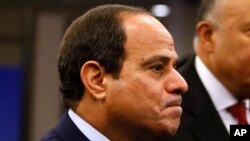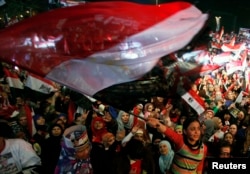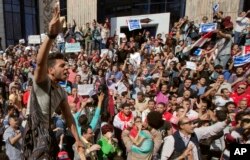It is a hot afternoon in the Muslim fasting month of Ramadan and the New Cairo clubhouse is empty. Hisham Genena, Egypt's erstwhile corruption tsar, settles in a corner. "It's quiet here," he says. "We can speak freely."
It has been a long way down for Genena, a former policeman and judge who was appointed to head Egypt's corruption watchdog in 2012 and is now on trial, accused of defaming the state by exaggerating the scale of public sector graft.
Genena says he has done nothing wrong and his case is being used to discourage others from speaking out in a country he says is increasingly in the grip of security agencies.
"I am keen on the success of any president because his success is our success ... but the attitude I'm seeing of using a security grip or reproducing the police state will not be productive," he told Reuters.
"When political parties are absent, NGOs are absent, local media is being crushed, international media too ... is that a sign of a healthy environment in which a country can flourish?"
Three years after general-turned-President Abdel Fattah el-Sissi ousted the Muslim Brotherhood, a crackdown that first targeted opposition activists has now turned on establishment figures like Genena to TV presenters and street performers.
Judges who have opposed mass death sentences have been retired. The head of the Press Syndicate and his deputy are standing trial for the first time in the institution's history.
And this week, citing alleged visa violations, police deported the British-Lebanese host of a talk show launched after the 2011 uprising that ended Hosni Mubarak's 30-year rule and raised hopes of a new era of political openness and social justice.
Galloping repression
A law requiring interior ministry go-ahead for any public gathering of more than 10 people is so strictly enforced that police on Monday dispersed hundreds of pupils protesting that their exams had been delayed because the questions were leaked.
"Egypt's past chasing its future," one commentator tweeted, with a picture of riot police chasing secondary schoolchildren.
Critics, including Genena, say that state repression has gathered such momentum since Sissi took power that it can be only compared to the 1950s, when Gamal Abdel Nasser's Free Officers toppled the king, imposed military rule and silenced dissent.
Genena fell foul of authorities when he told reporters last year that graft had cost the state 600 billion Egyptian pounds ($68 billion) in four years — an estimate he says is based on official reports. A fact-finding committee set up by Sissi said those numbers were misleading, according to government-owned Al Ahram.
The court has yet to rule on Genena's case, but he lost his job as head of the Central Auditing Authority in March.
"Sissi repeatedly called for fighting corruption. ... Why did he allow this to happen?" said Genena. "Corruption is very dangerous ... corruption fosters and creates a fertile environment for the growth of terrorism."
Sissi has called Islamist militants an existential threat and has made security a priority for Egypt, a country of more than 80 million people in a region beset by conflict in Libya, Syria, Iraq and beyond.
In a recent TV interview to mark his achievements in office, Sissi said the fight against graft was ongoing and unimpeded.
He said that unnamed evildoers sought to harm Egypt but dismissed claims that Egypt's jails were bulging with political detainees, saying 90 percent of inmates were criminals.
Sissi also said Egyptians were free to express themselves but urged more focus on rights to security, education and health.
No turnaround
Sissi seized power on the back of protests that began on June 30, 2013, and ended a divisive experiment in Brotherhood rule.
The Brotherhood won Egypt's first free parliamentary and presidential elections after the 2011 revolt but faced protests within a year amid power cuts, petrol shortages and resistance from state institutions. Its supporters see Sissi as a usurper.
But a broad cross section of the public admired the stern general in dark sunglasses, who promised to restore stability.
Even after security forces killed hundreds of Brotherhood supporters in the street and detained thousands, shops sold out of cakes decorated with Sissi's face. A year on, Sissi was elected president with 97 percent of the vote.
But Sissi's star has faded as an economic renaissance has failed to materialize; inflation has reached seven-year highs, hard currency is in short supply, the pound is under pressure and economic growth is slowing.
"Tell Sissi, tell the president, we can't live like this," said Mohamed Mahmoud, a baker in a poor area of Cairo. He says beleaguered customers have cut spending and his profit is now about 50 pounds a day, not enough for the family of seven.
Economists have derided what they see as Sissi's ill-conceived infrastructure mega-projects, crowned by the costly Suez Canal extension, which have been rushed through under military supervision.
Sissi said in his TV interview that such projects were needed because of a legacy of underinvestment in infrastructure.
However, while they have shown rapid results, they have failed to create jobs for a rapidly growing population.
"What were the three main pillars that he promised? Stability, economic growth and security, and he has failed on all three counts," said Timothy Kaldas, nonresident fellow at the Tahrir Institute for Middle East Policy.
"So they are doubling down. ... If they can get away with expanding their repression against high-level targets and keep people in line, why wouldn't they?"
'No one cares'
Without international pressure, say activists, Sissi has little incentive to loosen his grip. France has sold Sissi's Egypt billions of dollars' worth of arms and U.S. military aid has continued as Egypt battles Islamic State militants in Sinai.
"Nobody is going to twist Egypt's arm about this now. No one cares. They think it is the best they will get right now," said Kaldas. "Another thing that helps them is that the population has had two uprisings — in their eyes, anyway — and after both the situation did not improve. On the contrary, it deteriorated."
But with the country lurching from one crisis to the next, criticism has mounted on social media and burst into the once-fawning press, as Egyptians have begun to openly mock Sissi's increasingly rambling speeches.
Early this year, videos appeared online in which a group of youths performed skits in the street satirizing Egypt's crackdown, mocking its foreign policy and skewering its leader.
By early May, four members of Atfal al-Shawareh, or Street Children, were behind bars, accused of trying to overturn the ruling order and undermine the state. A fifth is out on bail.
Friends and family said they were shocked that a handful of videos by an unknown group could prompt such serious charges.
More than 200 people were detained in April in connection with protests against the government's plan to hand over two Red Sea islands to Saudi Arabia — a subject featured in Atfal al-Shawareh's skits. Many have received jail terms or fines but most have since been acquitted.
"Can you imagine how it is to be a young person in medical college or any other college and be imprisoned for a year or two?" said Mohamed Sadat, who heads the human rights committee in parliament.
"Will they come out good citizens? Or people full of hatred ... without loyalty or belonging to this country?"








